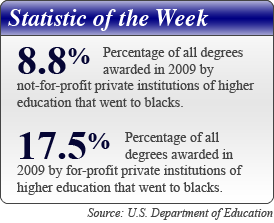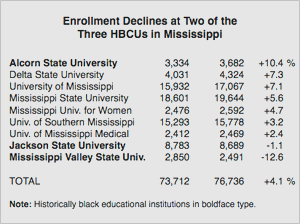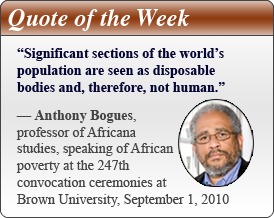The Large Gender Gap in African-American Degree Awards
 Last week the JBHE Weekly Bulletin reported preliminary data on the number of degrees earned by African Americans in the 2008-09 academic year. This week we look at the gender disparity in degree awards to blacks. Last week the JBHE Weekly Bulletin reported preliminary data on the number of degrees earned by African Americans in the 2008-09 academic year. This week we look at the gender disparity in degree awards to blacks.
In the 2008-09 academic year, black women earned 64,694, or 68.5 percent, of the 94,409 associate’s degrees earned by African Americans.
In bachelor’s degree awards, black women earned 96,105 degrees compared to 49,729 degrees earned by black men. Thus, black women earned 65.9 percent — roughly two thirds — of all African-American bachelor’s degrees. In contrast, white women earned 56 percent of all bachelor’s degrees earned by white Americans.
Black women earned 44,674 master’s degrees in the 2008-09 academic year. Black men were awarded 17,495 master’s degrees. Therefore, black women took 71.9 percent of all African-American master’s degrees.
Of the 9,300 professional and doctoral degrees earned by African Americans in the 2008-09 academic year, 65.5 percent went to black women. For whites, women earned 51 percent of all doctoral and professional degrees.

NATIONAL ASSOCIATION OF AFRICAN AMERICAN STUDIES

19th Annual NAAAS & Affiliates National Conference
February 14-19, 2011
Crowne Plaza Executive Center
Baton Rouge, Louisiana
Abstracts, not to exceed two (2) pages, should be submitted that relate to any aspect of the African and African American experience. Subjects may include, but are not limited to: literature, demographics, history, politics, economics, education, health care, fine arts, religion, social sciences, business and many other subjects. Please indicate the time required for presentation of your paper (25 minutes OR 45 minutes).
ABSTRACTS WITH TITLE OF PAPER, PRESENTER’S NAME, HOME AND INSTITUTION/ORGANIZATION ADDRESS AND E-MAIL SHOULD BE POSTMARKED BY: Friday, November 5, 2010.
SEND ABSTRACTS TO:
Dr. Lemuel Berry, Jr.
Executive Director, NAAAS & Affiliates
PO Box 6670
Scarborough, ME 04070-6670
Telephone: 207/839-8004
Fax: 207/839-3776
Email: naaasconference@earthlink.net
www.NAAAS.org

The Ongoing Saga of the Fisk University Art Collection
 For several years now, Fisk University, the historically black educational institution in Nashville, has been trying to sell all or part of its 101-piece Stieglitz Collection, which was donated to the university by artist Georgia O’Keeffe. The collection includes many paintings by O’Keeffe, as well as other works. The collection is valued at about $75 million. For several years now, Fisk University, the historically black educational institution in Nashville, has been trying to sell all or part of its 101-piece Stieglitz Collection, which was donated to the university by artist Georgia O’Keeffe. The collection includes many paintings by O’Keeffe, as well as other works. The collection is valued at about $75 million.
But a stipulation in the O’Keeffe gift says that the collection cannot be sold and must be displayed. Fisk University maintains that it needs funds from the sale of the art to remain financially viable. The university had planned to loan the collection to the Crystal Bridges Museum of American Art in Bentonville, Arkansas, for six months each year. The museum would pay Fisk $30 million. But this plan has also been rejected by the court.
Tennessee Attorney General Bob Cooper put forth a plan to move the collection to the Frist Center for the Visual Arts in downtown Nashville. Fisk officials called the proposal a “theft” and students mounted a protest against the plan. A chancellory court judge has now rejected the attorney general’s plan and has given the parties until October 8 to come up with an alternative.
Should Money Be Spent to Restore a House Where Langston Hughes Once Rented a Room?
 The Cleveland Landmarks Commission wants to designate as a historic landmark an 1890s home where Langston Hughes rented a room. The African-American poet lived in the home when he was a high school student. The home is referred to in several of Hughes’ poems. It is estimated that it would cost at least $100,000 to restore the home. The Cleveland Landmarks Commission wants to designate as a historic landmark an 1890s home where Langston Hughes rented a room. The African-American poet lived in the home when he was a high school student. The home is referred to in several of Hughes’ poems. It is estimated that it would cost at least $100,000 to restore the home.
Anne Trubek, an associate professor of English at Oberlin College in Ohio, is the author of the forthcoming book, A Skeptic’s Guide to Writers’ Houses. Professor Trubek believes that making writers’ homes into museums may not be the best use of money. She speculates that funds raised to restore a writer’s home would be better used to distribute copies of his or her work to young students. She notes that homes restored to honor Edith Wharton and Mark Twain were foreclosed on last year.
Penn Economists Find a Large Drop in the Racial Happiness Gap
 Economists at the University of Pennsylvania have found that African Americans in the United States have become significantly more happy than was the case in the 1970s. The study found that blacks, in general, remain less happy than whites but that the gap has narrowed significantly by about 40 percent. Economists at the University of Pennsylvania have found that African Americans in the United States have become significantly more happy than was the case in the 1970s. The study found that blacks, in general, remain less happy than whites but that the gap has narrowed significantly by about 40 percent.
The researchers conclude that a reduction in prejudice and discrimination and increased opportunities for blacks in education and employment are reasons for a reduction in the happiness gap. Another reason the gap is closing is because the level of happiness among whites has declined.
The research did show that the happiness of young black males has not increased. High levels of unemployment and incarceration among young black males were cited for the reasons that happiness levels among this group have not improved.
For the First Time, the Entering Class at the University of Texas Is Less Than Half White: But Black Enrollments Still Far From Parity With State’s Black Population
 For the first time in its history, the University of Texas at Austin has an entering first-year class that is less than one half non-Hispanic white. This year, non-Hispanic whites make up 47.6 percent of the entering class. A year ago, whites were 51.1 percent of incoming students. Non-Hispanic whites make up about 45.1 percent of the population in Texas. For the first time in its history, the University of Texas at Austin has an entering first-year class that is less than one half non-Hispanic white. This year, non-Hispanic whites make up 47.6 percent of the entering class. A year ago, whites were 51.1 percent of incoming students. Non-Hispanic whites make up about 45.1 percent of the population in Texas.
There are 372 black students in the first-year class. They make up 5.1 percent of the incoming students. A year ago, there were 354 black freshmen who made up 4.9 percent of the entering class. Blacks are 11.5 percent of the total population in Texas.

PRINCETON UNIVERSITY

Faculty and Fellowship Positions
The Center for African American Studies at Princeton University (CAAS) invites applications for the 2011-2012 academic year. For full consideration, materials must be received by November 20, 2010 and we encourage all candidates to use the online application process to submit their materials. You may apply online at: http://jobs.princeton.edu. Click here for a full description of the positions and application procedures. For questions, please contact Dr. Noliwe Rooks (nrooks@princeton.edu).
Distinguished Visitor:
CAAS invites nominations or self-nominations for faculty members from research universities, liberal arts colleges, and from independent scholars for a Visiting Appointment for the 2011-2012 academic year. This visiting appointment was established to enable the Center to invite one scholar each year whose research and teaching explicitly examines issues of race in innovative interdisciplinary ways. Candidates in any field may apply. The Distinguished Visitor may be appointed for one semester or for the entire academic year.
Post Doctoral Fellows:
CAAS invites applications from pre-tenure scholars and recent Ph.D. graduates in all disciplines for two postdoctoral fellowship positions. These fellowship positions will be awarded for the academic year 2011-2012 to emerging scholars who will devote their ten-month residency at Princeton to writing about race in the national or global contexts. Fellows will hold a research appointment for the length of the 10-month fellowship period.
Princeton University is an equal opportunity employer and complies with applicable EEO and affirmative action regulations.

In Memoriam
Ronald William Walters (1938-2010)
 Ronald W. Walters, civil rights activist, columnist, author, and educator, has died at a hospital in Bethesda, Maryland, after a battle with cancer. He was 72 years old. Ronald W. Walters, civil rights activist, columnist, author, and educator, has died at a hospital in Bethesda, Maryland, after a battle with cancer. He was 72 years old.
Professor Walters was a native of Wichita, Kansas. He was a pioneer of the lunch counter sit-in movement. In 1958, two years before the Greensboro protests that ignited a lunch counter sit-in movement throughout the South, Walters and a cousin organized a sit-in at a whites-only lunch counter at a Wichita drug store. After three weeks of protests, the owner of the store relented and decided to serve African Americans.
Walters went on to Fisk University in Nashville where he earned a bachelor’s degree in 1963. He later earned a master’s degree in African studies and a Ph.D. in international studies at American University in Washington, D.C.
Dr. Walters taught first at Syracuse University and then chaired the African-American studies program at Brandeis University. In the early 1970s, Walters joined the faculty at Howard University and later chaired the political science department. He moved to the University of Maryland in 1996.
At the time of his death he was professor emeritus of government and politics at the University of Maryland and director of the African-American Leadership Institute. He was planning to return to Howard University as a senior research fellow.
Professor Walters was a syndicated newspaper columnist, a contributor to JBHE, and the author of nine books including his most recent work, The Price of Racial Reconciliation (University of Michigan Press, 2008).

Honors and Awards
 • Carole Boston Weatherford, professor of English at Fayetteville State University in North Carolina, will receive the North Carolina Award from Governor Beverly Purdue at ceremonies next month. The award is the highest civilian honor bestowed by the state of North Carolina. • Carole Boston Weatherford, professor of English at Fayetteville State University in North Carolina, will receive the North Carolina Award from Governor Beverly Purdue at ceremonies next month. The award is the highest civilian honor bestowed by the state of North Carolina.
An award-winning poet and author, Professor Weatherford holds master’s degrees from the University of Baltimore and the University of North Carolina at Greensboro.
 • Timika Hoffman-Zoller, a project assistant for the University of Chicago Police Department, received the National Citizen Corps Achievement Award from the Federal Emergency Management Agency. She was honored for her work to promote child safety in the home. • Timika Hoffman-Zoller, a project assistant for the University of Chicago Police Department, received the National Citizen Corps Achievement Award from the Federal Emergency Management Agency. She was honored for her work to promote child safety in the home.
Grants and Gifts
• The University of Arkansas at Pine Bluff, a historically black educational institution, received a $231,743 grant from the National Science Foundation to upgrade the university’s computer technology.
• Historically black Central State University in Wilberforce, Ohio, received a three-year, $600,000 grant from the U.S. Department of Education. The grant will fund structured mentoring and tutoring sessions for students in entry-level science and mathematics courses.
• Harvard University’s Committee on African Studies received a four-year, $2.5 million grant from the U.S. Department of Education. The grant will establish a National Resource Center for the study of African languages.
• The University of Maryland Eastern Shore received a $148,892 grant from the U.S. Department of Agriculture. The historically black educational institution will use the funds to support volunteer programs for students in the department of human ecology to work with local businesses and nonprofit organizations.
• Cornell University received a $1.6 million research grant from the National Science Foundation for research aimed to improve soil quality at small farms in Kenya.
|
Enrollment Declines Could Produce Budget Shortfalls at HBCUs in Mississippi
This fall, enrollments at the eight state-operated universities in Mississippi are up 4.1 percent from a year ago. The eight universities now enroll a record 76,736 students. The rising enrollments produce greater tuition revenues, which will help these universities deal with shrinking appropriations from the state government.
However, two of the eight universities in the system saw a decline in enrollments. And both universities that experienced a drop in attending students are historically black institutions.
Jackson State University has 1.1 percent fewer students than a year ago. At Mississippi Valley State University, enrollments are off significantly. In 2009, there were 2,850 students on campus. This fall, there are 2,491, a drop of 12.6 percent. The university had forecast no change in enrollments. Therefore, the drop-off in tuition revenue will, in all likelihood, produce a further budgetary shortfall.


The Persisting Racial Gap on the SAT College Entrance Examination
 In 2010, 196,961 African-American high school seniors took the SAT college entrance examination. They represented 13 percent of all SAT test takers in the Class of 2010. In 2010, 196,961 African-American high school seniors took the SAT college entrance examination. They represented 13 percent of all SAT test takers in the Class of 2010.
The mean score for blacks on the combined critical reading and mathematical portions of the SAT was 857. This was a two-point improvement from a year ago.
The mean score for whites on the reading and mathematics sections of the SAT was 1064, 207 points higher than the mean score for blacks.
Despite a small two-point decline in the racial gap this year, the long-term trend is not encouraging. Since 1988, the racial gap on the reading and mathematics sections of the SAT has increased from 189 points to 207 points.


UNIVERSITY OF TORONTO

Two Tenure-Stream Faculty Positions in Social Work
The Factor-Inwentash Faculty of Social Work invites applications for two tenure-stream faculty positions. These positions are at the rank of Assistant or Associate Professor. Appointments will be made at a level appropriate to the qualifications and track record of successful applicants. Salary will be commensurate with qualifications and experience. Appointments will begin July 1, 2011.
- One position in Law and Social Work (Job # 1000553)
- One Joint position in Policy at the Factor-Inwentash Faculty of Social Work and the School of Public Policy and Governance, Faculty of Arts and Science (Job # 1000562)
A full description of the positions can be found on our website here.
Applicants are strongly encouraged to apply online at http://www.jobs.utoronto.ca/faculty.htm (search by job numbers).

The Higher Education of the First Black Woman Named to a Maryland Appeals Court
 Maryland Governor Martin O’Malley recently appointed Michele D. Hotten to the Court of Special Appeals for the Fourth Appellate Circuit. Judge Hotten is the first African-American woman to hold a seat on any appeals court in the state of Maryland. Previously, she served as a circuit court judge in Prince George’s County. Maryland Governor Martin O’Malley recently appointed Michele D. Hotten to the Court of Special Appeals for the Fourth Appellate Circuit. Judge Hotten is the first African-American woman to hold a seat on any appeals court in the state of Maryland. Previously, she served as a circuit court judge in Prince George’s County.
Judge Hotten is a graduate of the University of South Florida and the Howard University School of Law.
Tuskegee University Among Group of 11 American Educational Institutions Receiving Grants for Development Projects in Africa
 The U.S. Agency for International Development and Higher Education for Development, a Washington-based consortium of educational associations, have issued grants of up to $1.1 million to 11 U.S. universities for projects involving development in Africa. Each American university will work with a partner university in Africa. The U.S. Agency for International Development and Higher Education for Development, a Washington-based consortium of educational associations, have issued grants of up to $1.1 million to 11 U.S. universities for projects involving development in Africa. Each American university will work with a partner university in Africa.
The American universities include Brown, Colorado State, Indiana, Michigan State, North Dakota State, Ohio State, Syracuse, Tuskegee, the University of Cincinnati, Virginia Tech, and the University of Connecticut.
 Tuskegee University in Alabama is the only historically black university taking part in the project. It will work with the International Institute for Water and Environmental Engineering in Burkina Faso to develop faculty and curriculum for environmental science and technology that will be used to improve access to clean water. Tuskegee will work with universities in Ghana and Nigeria on the project. Tuskegee University in Alabama is the only historically black university taking part in the project. It will work with the International Institute for Water and Environmental Engineering in Burkina Faso to develop faculty and curriculum for environmental science and technology that will be used to improve access to clean water. Tuskegee will work with universities in Ghana and Nigeria on the project.
Howard University Partners With Government of Bermuda to Provide Medical and Psychiatric Services
The department of psychiatry and behavioral sciences at historically black Howard University in Washington, D.C., has entered into an agreement with the island of Bermuda. Ewart Brown, premier of Bermuda, is a graduate of the Howard University College of Medicine.
Under the agreement, Howard University will provide consultation services to psychiatrists in Bermuda. These services will include telepsychiatry sessions with Bermudan patients. In addition, Howard University faculty will visit Bermuda and participate in training and other activities.
 The partnership will be headed by William B. Lawson, chair of the department of psychiatry and behavioral sciences. Dr. Lawson is a graduate of Howard University. He holds a master’s degree from the University of Virginia and a Ph.D. in psychology from the University of New Hampshire. He completed his medical training at the University of Chicago and did his residency at the Stanford University Medical Center. The partnership will be headed by William B. Lawson, chair of the department of psychiatry and behavioral sciences. Dr. Lawson is a graduate of Howard University. He holds a master’s degree from the University of Virginia and a Ph.D. in psychology from the University of New Hampshire. He completed his medical training at the University of Chicago and did his residency at the Stanford University Medical Center.

NORTHEASTERN UNIVERSITY

Master of Science in College Student Development
and Counseling
Bouvé College of Health Sciences
Leadership, multiculturalism and management of rapid change in higher education are the focus of our two-year program which includes a year-long practicum experience.
www.csdc.neu.edu

Appointments, Promotions, and Resignations
 • E. D’Wayne Robinson is the new associate director of athletics at Clark Atlanta University. He was the associate athletic director for compliance at Alabama State University. • E. D’Wayne Robinson is the new associate director of athletics at Clark Atlanta University. He was the associate athletic director for compliance at Alabama State University.
Robinson is a graduate of Tougaloo College. He holds a master’s degree from Alcorn State University and is currently pursuing a doctorate in higher education administration.
 • Debra Matthews was appointed chair of the English department at Macon State College in Georgia. Professor Matthews has been on the Macon State faculty for 20 years. • Debra Matthews was appointed chair of the English department at Macon State College in Georgia. Professor Matthews has been on the Macon State faculty for 20 years.
Dr. Matthews is a graduate of Albany State University. She holds a master’s degree from Howard University and a Ph.D. in English from Georgia State University.
 • Maria Arvelo Lumpkin is the new director of the Alfonso Elder Student Union at North Carolina Central University in Durham. She was the director of student life and engagement at Spelman College in Atlanta. • Maria Arvelo Lumpkin is the new director of the Alfonso Elder Student Union at North Carolina Central University in Durham. She was the director of student life and engagement at Spelman College in Atlanta.
Dr. Lumpkin is a graduate of Saint Augustine’s College in Raleigh, North Carolina. She holds a master’s degree in urban studies from Old Dominion University and a doctorate in educational leadership from Clark Atlanta University.
 • Doria Kathy Stitts was appointed associate provost for lifelong learning programs at Winston-Salem State University in North Carolina. She has been an associate professor of marketing and associate dean of the business school at WSSU since 2003. • Doria Kathy Stitts was appointed associate provost for lifelong learning programs at Winston-Salem State University in North Carolina. She has been an associate professor of marketing and associate dean of the business school at WSSU since 2003.
Dr. Stitts holds a bachelor’s degree and an MBA from Florida A&M University and a Ph.D. in marketing from Florida State University.
• Patricia Williams Lessane was named director of the Avery Research Center for African American History and Culture at the College of Charleston. She was an assistant professor of social science and humanities at Roosevelt University in Chicago.
A graduate of Fisk University, Dr. Lessane holds a master’s degree from Dartmouth College and a Ph.D. in anthropology from the University of Illinois at Chicago.
• Malverse A. Nicholson Jr. was appointed dean of college life services at Prince George’s Community College in Maryland. He was director of student activities and judicial affairs at Virginia State University.
Nicholson is a graduate of Hampton University and holds a master’s degree from Norfolk State University.
 • La Vonne I. Neal is the new dean of the College of Education at Northern Illinois University in DeKalb. She was dean of the College of Education at the University of Colorado at Colorado Springs. • La Vonne I. Neal is the new dean of the College of Education at Northern Illinois University in DeKalb. She was dean of the College of Education at the University of Colorado at Colorado Springs.
Dr. Neal holds master’s and doctoral degrees from the University of Texas at Austin. She is the co-editor of Black History Bulletin.
 • Brenda Priestly Jackson was named special adviser to the interim president of Edward Waters College in Jacksonville, Florida. Jackson is currently chair of the Duval County School Board. • Brenda Priestly Jackson was named special adviser to the interim president of Edward Waters College in Jacksonville, Florida. Jackson is currently chair of the Duval County School Board.
 • Ansel Brown, assistant professor of political science at North Carolina Central University in Durham, was named dean of the University Honors Program. • Ansel Brown, assistant professor of political science at North Carolina Central University in Durham, was named dean of the University Honors Program.
Brown is a graduate of North Carolina Central University and Harvard Law School.
 • Adrian L. Jackson was named associate general counsel at Emory University in Atlanta. He was the primary real estate attorney for the city of Atlanta from 2006 to 2010. • Adrian L. Jackson was named associate general counsel at Emory University in Atlanta. He was the primary real estate attorney for the city of Atlanta from 2006 to 2010.
Jackson is a graduate of Harvard University and the Duke University School of Law.
|
 .
.